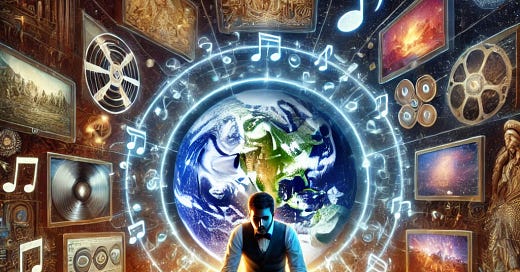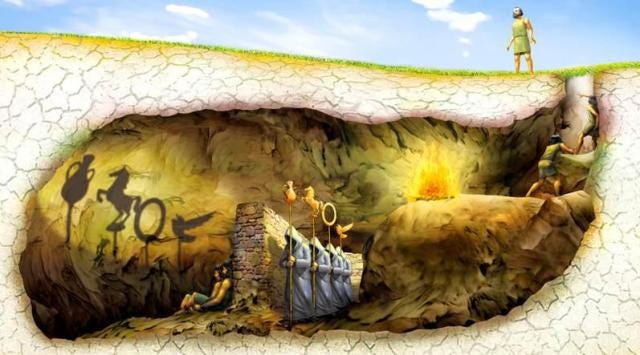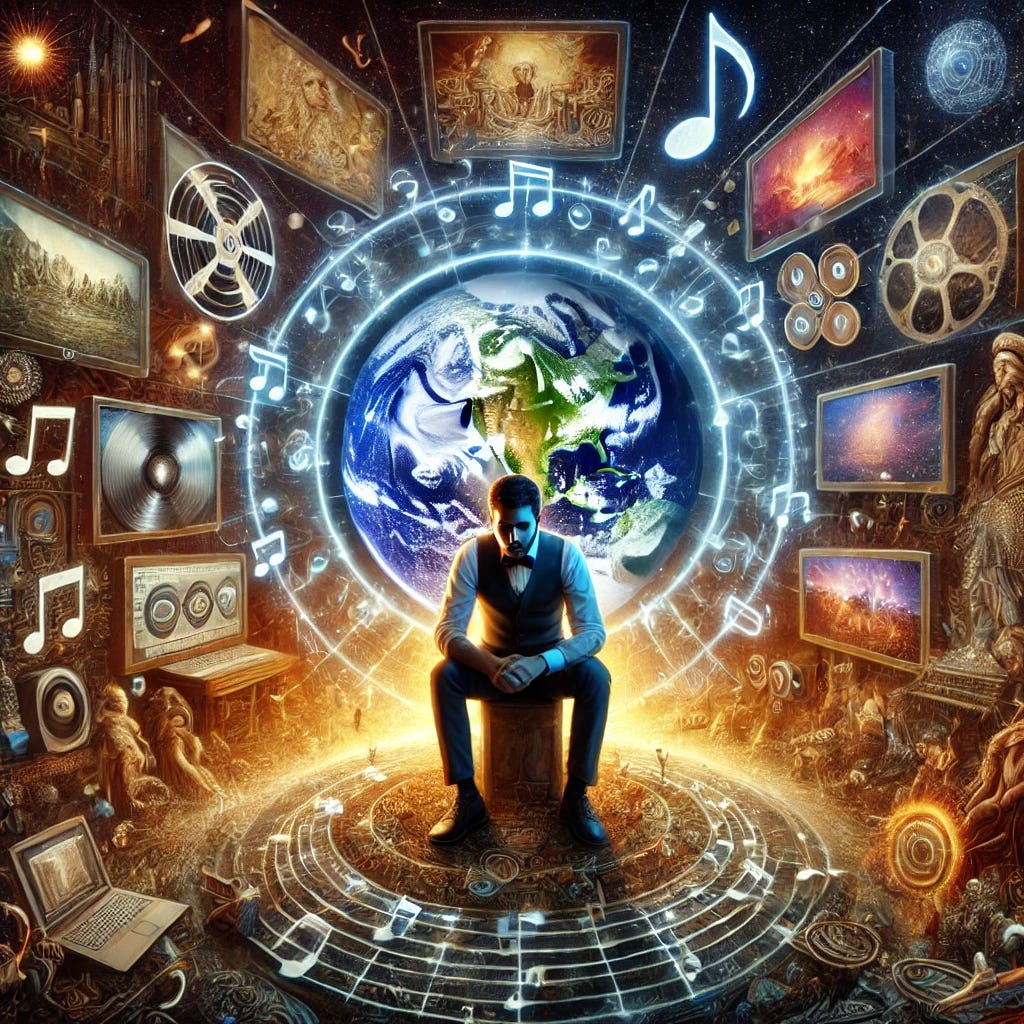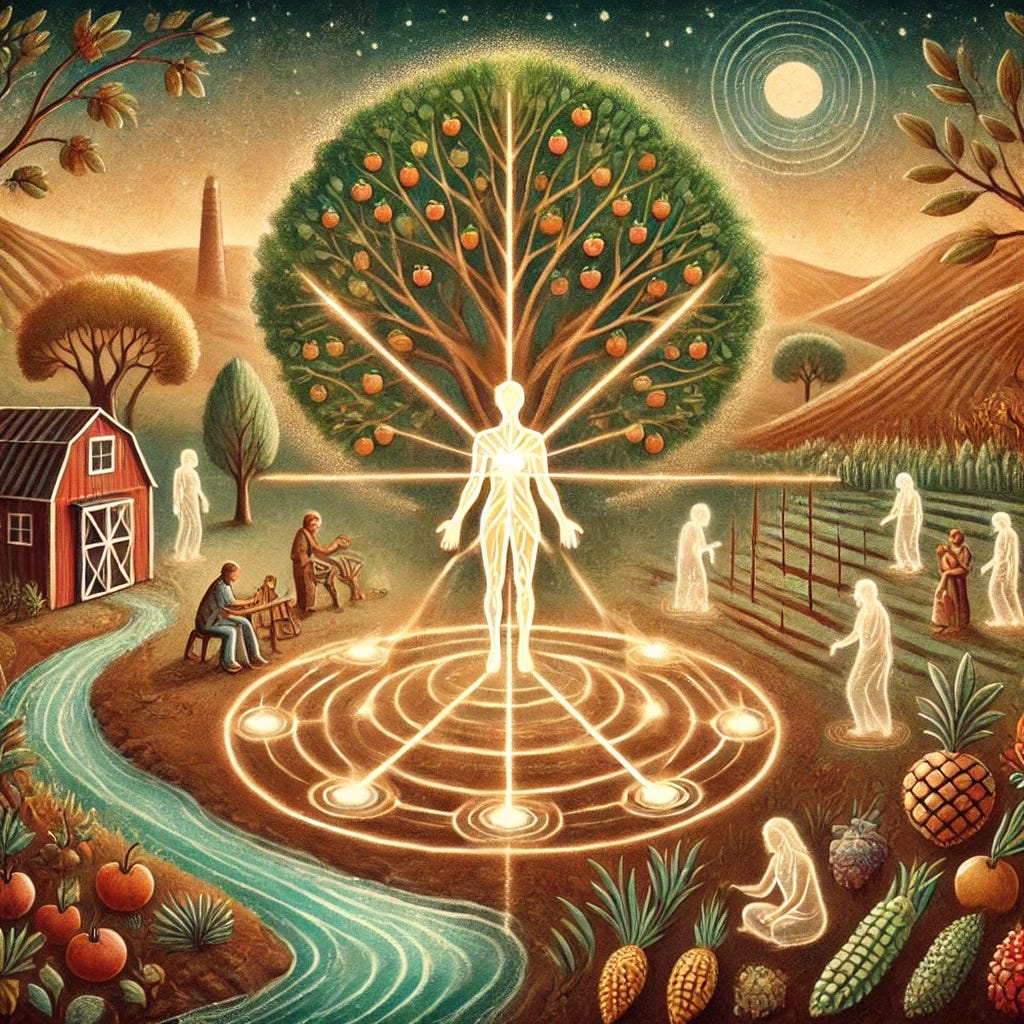Beyond Pseudoculture: Creating a Web of Meaning in a Fractured World
Reclaiming Authentic Experience in an Age of Repetitive Catharsis
I was getting a pizza down at the coast and onto the TV came a video of Rebecca Ferguson singing ‘Glitter & Gold’.
Maybe it’s just where I am in myself, but it sounded like so many songs I’ve heard over the years. So many melodies, and the beat was SO familiar too. Before I could zone in one one familiar part, the song moved on to yet another familiar melody, frustratingly never staying long enough for me to work out where I’d heard the initial melody before.
And all those melodies had struck emotional moments for me over the years. And nothing changed. It was just a loop. I know music is about ‘relatedness’. Movies too. And yet they are continuingly relating the same thing back to me. I can feel yes someone understands me, someone ‘gets me’, but nothing is resolved, it’s cathartic but not transformative.
Cathartic music often offers a temporary relief or an emotional purge, allowing people to express feelings that they may not otherwise articulate.
I remember being a teenager and listening to the Harry Nilsson song “Without You” over and over again. I had met a girl when I was on holidays and her family left the holiday park at the end of their holiday and I never got a chance to say goodbye or get her contact number. Tragedy for a young teenager. And this song was in the charts and I just played it on a loop. There was someone out there who knew what I was going through and had written this song specifically for me.
And there it was, my very own trauma echo chamber.
And that’s the way the songs and also movies have progressed over the years. They have got better at relating to us our trauma (well more appropriately ‘mini-trauma’), and keeping us in what is simply a dopamine loop. We get a temporary relief and a small hit of dopamine but because nothing has changed we need the next song (or concert) and the next movie and on it goes.
Meanwhile for the music and movie industry it’s the perfect recipe, dependent addicted customers whose symptoms are maintained, never resolved.
Plato’s Cave
The Allegory of Plato’s cave1 is where Plato described people being kept in a cave and mesmerised my shadows on a wall. They become so entranced in the cave and the images that they could never imagine that a world existed outside. In fact Plato felt they would find hearing the ‘truth’, that there was a world outside, quite difficult to believe even if they saw it for themselves.
The trauma echo chamber
And this for me is where have arrived at. Our very own Plato’s cave where people are caught in an echo chamber constantly having their mini-trauma related to in loop after loop. And as we have become addicted to this dopamine, we eventually become numb and end up looking into middle-distance and doom-scrolling on social media, replaying old songs over and over again or watching re-runs of movies until mesmerised we can happily sing along to each word and phrase.
Caveat
Just to be clear I’m not belittling real trauma. That’s not what I’m writing about here. You know the difference.
Is there an alternative to this echo chamber?
Of course there is.
‘Pseudoculture’
What has been ‘created’ is a ‘pseudoculture’, it’s not a real culture. Shock horror.
The term "pseudoculture" is used to describe a surface-level, artificial, or inauthentic version of culture that lacks the depth, meaning, and holistic integration of what could be considered a "true culture."
According to the American anthropologist, Clifford Geertz, ‘pseudoculture’ refers to a society where the symbols, rituals, beliefs, and practices are detached from their deeper, intrinsic meanings, and instead reflect a shallow, consumer-driven, or individualistic worldview.
A ‘pseudoculture’ creates a culture of emptiness, where individuals are always seeking the next purchase or experience to feel temporarily fulfilled but never satiated.
A True Culture
A true culture, by contrast, is rooted in authentic connection—to community, nature, and spiritual traditions. It fosters a sense of wholeness and belonging, offering individuals the opportunity to integrate meaningful rituals, traditions, and shared stories into a cohesive web of meaning that reinforces their connection to the world around them and their inner selves.
A Web with no meaning
What we have at the moment is a web with No Meaning. We’ve allowed our cultural context to be shrunk down to a goldfish bowl size.
At this point it has reached an exhaustion of culture. People just zone out. It’s quite understandable.
And AI is not helping, it’s just doing a mashup of it all, except faster than we would. Mixing music and movies and digitised artists and their voices all replayed again in different ways.
What we need is not temporary catharsis but transformation.
If we take music, Transformation ( Music within a ritual framework), would facilitate deeper spiritual and emotional change, connecting individuals to shared meanings and higher purposes. Providing lasting transformation by helping people navigate life’s transitions and reconnect with community and nature.
Is this not what our psyche’s yearn for and we intuitively is available to us?
Instead of having our echo chamber related back to us by a plethora of screens on TV’s or mobile phones, can we go outside Plato’s cave of shadows and find what we so deeply yearn for - a bigger context.
We’ve seen enough TV shows2, enough songs and enough movies.
The bigger context which we’ve been limited down from is our connection to the heavens, the Earth and our ancestors. Think of it. Indigenous peoples lived, and some still live, in huge contexts where they feel connected to the Cosmos, the Earth and their ancestors. Their context has a vertical axis (heaven to Earth) and a horizontal axis (back to their ancestors).
They know where they are in the Cosmos, they know their coordinates.
A Web of Meaning
They have a web of meaning that holds together a True Culture that supports them, gives them meaning and belonging. That’s a hugely different life than our ‘pseudoculture’. Yet it’s available to us in this moment. We have to pull out of the ‘pseudoculture’ and create our own web of meaning.
I will be writing more about the creation of this True Culture and the web of meaning that it gives us.
Plato’s Cave image: https://www.studiobinder.com/blog/platos-allegory-of-the-cave/
Image of old televisions. https://png.pngtree.com/background/20230616/original/pngtree-old-televisions-all-stacked-and-pinned-in-a-circle-picture-image_3620097.jpg









I read somewhere that every major civilization in history (those that have had "true culture" at least in one stage of development) has been based on a clear and believable explanation of cosmic and human reality. In our own cultural background, the truth of the Judeo-Christian faith was largely accepted. As the cultural centers moved to a purely materialist cosmology, our "network of meaning" disintegrated. Our recovery of cultural competency needs to begin with the endlessly exciting question of whether our world is merely a long fluctuation of atoms, or is nested in a transcendent Divine Romance. Do we really know that the God of Genesis, Exodus, Matthew, Mark, and Luke is a 5,000 year hoax? Did Shakespeare and Michaelangelo know something of which we are unaware?
Pseudoculture is the experience. True culture is what we need. Thanks for pointing that out in such a poignant manner.